MARK1022 - Foundation of Scholarship: Customer Loyalty Analysis Report
VerifiedAdded on 2021/02/20
|12
|3729
|253
Report
AI Summary
This report delves into the concepts of customer relationship marketing (CRM) and customer loyalty within the retail sector. It begins by defining CRM as a business process focused on building customer relationships, loyalty, and brand value through strategic marketing activities. The report then explores the core concepts of customer loyalty, emphasizing its role in driving repeat purchases and enhancing brand image. It examines the interconnectedness of customer relationship and customer loyalty, highlighting how businesses strive to provide superior customer service to foster loyalty and generate reliable revenue streams. The report further discusses factors affecting relationship marketing, such as product, organization structure, and marketing strategies. It also analyzes the impact of relationship marketing strategies on customer loyalty, including brand loyalty, salesperson loyalty, product loyalty, and service loyalty. Finally, the report concludes by examining the effects of CRM in retail markets, including identifying customers, analyzing their habits, and utilizing loyalty schemes to enhance sales and gather customer information.

MARK1022 – FOUNDATION
OF SCHOLARSHIP
OF SCHOLARSHIP
Paraphrase This Document
Need a fresh take? Get an instant paraphrase of this document with our AI Paraphraser
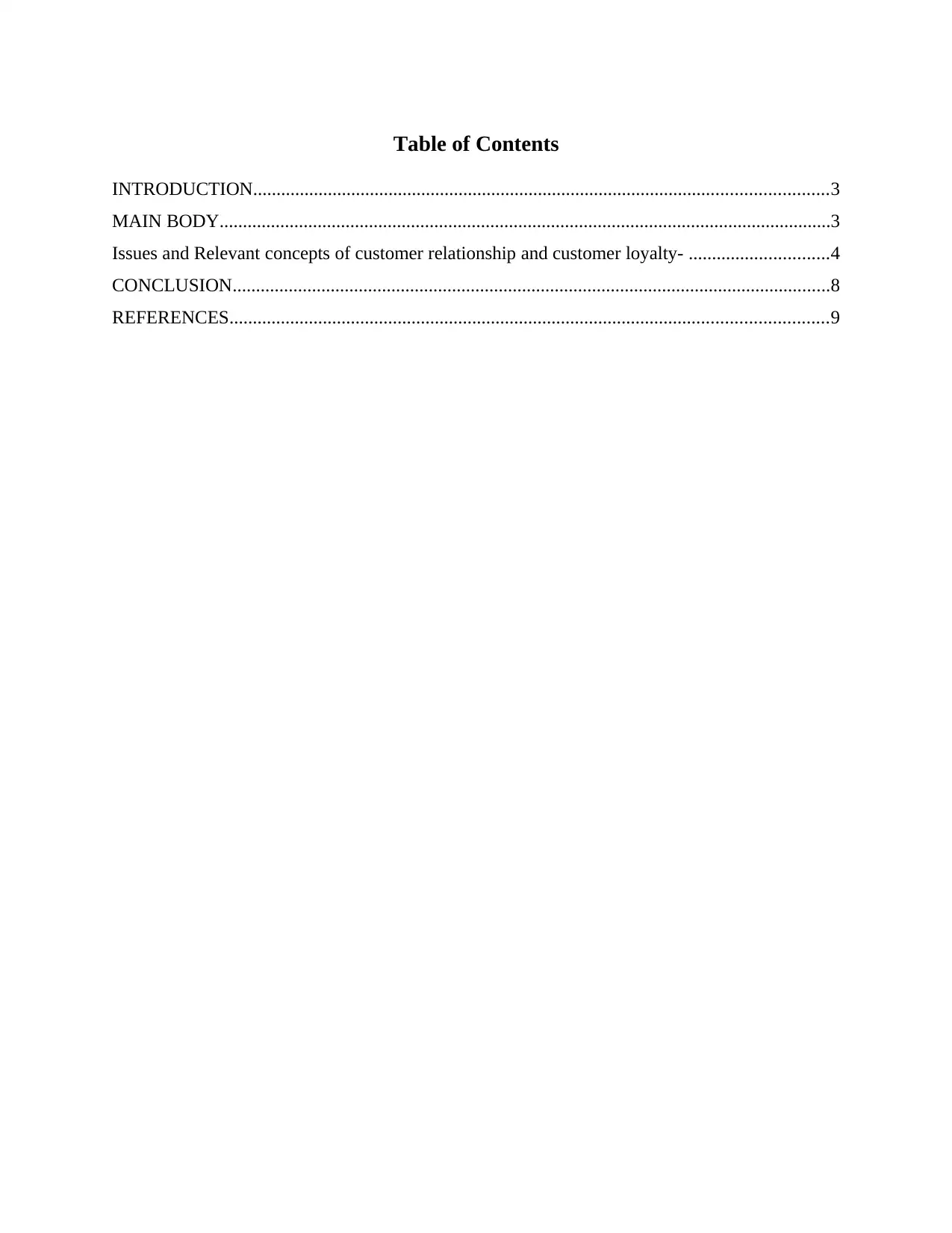
Table of Contents
INTRODUCTION...........................................................................................................................3
MAIN BODY...................................................................................................................................3
Issues and Relevant concepts of customer relationship and customer loyalty- ..............................4
CONCLUSION................................................................................................................................8
REFERENCES................................................................................................................................9
INTRODUCTION...........................................................................................................................3
MAIN BODY...................................................................................................................................3
Issues and Relevant concepts of customer relationship and customer loyalty- ..............................4
CONCLUSION................................................................................................................................8
REFERENCES................................................................................................................................9
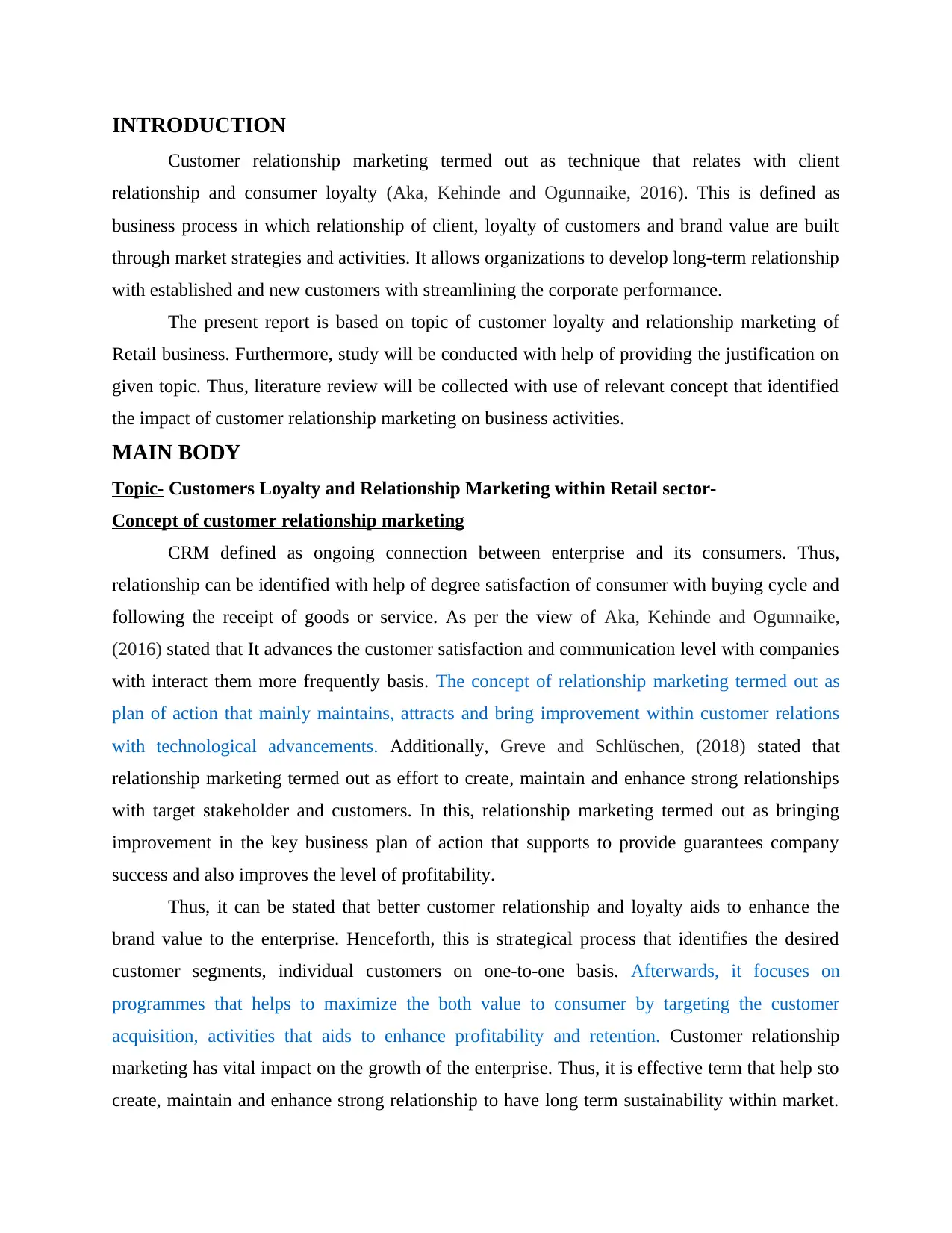
INTRODUCTION
Customer relationship marketing termed out as technique that relates with client
relationship and consumer loyalty (Aka, Kehinde and Ogunnaike, 2016). This is defined as
business process in which relationship of client, loyalty of customers and brand value are built
through market strategies and activities. It allows organizations to develop long-term relationship
with established and new customers with streamlining the corporate performance.
The present report is based on topic of customer loyalty and relationship marketing of
Retail business. Furthermore, study will be conducted with help of providing the justification on
given topic. Thus, literature review will be collected with use of relevant concept that identified
the impact of customer relationship marketing on business activities.
MAIN BODY
Topic- Customers Loyalty and Relationship Marketing within Retail sector-
Concept of customer relationship marketing
CRM defined as ongoing connection between enterprise and its consumers. Thus,
relationship can be identified with help of degree satisfaction of consumer with buying cycle and
following the receipt of goods or service. As per the view of Aka, Kehinde and Ogunnaike,
(2016) stated that It advances the customer satisfaction and communication level with companies
with interact them more frequently basis. The concept of relationship marketing termed out as
plan of action that mainly maintains, attracts and bring improvement within customer relations
with technological advancements. Additionally, Greve and Schlüschen, (2018) stated that
relationship marketing termed out as effort to create, maintain and enhance strong relationships
with target stakeholder and customers. In this, relationship marketing termed out as bringing
improvement in the key business plan of action that supports to provide guarantees company
success and also improves the level of profitability.
Thus, it can be stated that better customer relationship and loyalty aids to enhance the
brand value to the enterprise. Henceforth, this is strategical process that identifies the desired
customer segments, individual customers on one-to-one basis. Afterwards, it focuses on
programmes that helps to maximize the both value to consumer by targeting the customer
acquisition, activities that aids to enhance profitability and retention. Customer relationship
marketing has vital impact on the growth of the enterprise. Thus, it is effective term that help sto
create, maintain and enhance strong relationship to have long term sustainability within market.
Customer relationship marketing termed out as technique that relates with client
relationship and consumer loyalty (Aka, Kehinde and Ogunnaike, 2016). This is defined as
business process in which relationship of client, loyalty of customers and brand value are built
through market strategies and activities. It allows organizations to develop long-term relationship
with established and new customers with streamlining the corporate performance.
The present report is based on topic of customer loyalty and relationship marketing of
Retail business. Furthermore, study will be conducted with help of providing the justification on
given topic. Thus, literature review will be collected with use of relevant concept that identified
the impact of customer relationship marketing on business activities.
MAIN BODY
Topic- Customers Loyalty and Relationship Marketing within Retail sector-
Concept of customer relationship marketing
CRM defined as ongoing connection between enterprise and its consumers. Thus,
relationship can be identified with help of degree satisfaction of consumer with buying cycle and
following the receipt of goods or service. As per the view of Aka, Kehinde and Ogunnaike,
(2016) stated that It advances the customer satisfaction and communication level with companies
with interact them more frequently basis. The concept of relationship marketing termed out as
plan of action that mainly maintains, attracts and bring improvement within customer relations
with technological advancements. Additionally, Greve and Schlüschen, (2018) stated that
relationship marketing termed out as effort to create, maintain and enhance strong relationships
with target stakeholder and customers. In this, relationship marketing termed out as bringing
improvement in the key business plan of action that supports to provide guarantees company
success and also improves the level of profitability.
Thus, it can be stated that better customer relationship and loyalty aids to enhance the
brand value to the enterprise. Henceforth, this is strategical process that identifies the desired
customer segments, individual customers on one-to-one basis. Afterwards, it focuses on
programmes that helps to maximize the both value to consumer by targeting the customer
acquisition, activities that aids to enhance profitability and retention. Customer relationship
marketing has vital impact on the growth of the enterprise. Thus, it is effective term that help sto
create, maintain and enhance strong relationship to have long term sustainability within market.
⊘ This is a preview!⊘
Do you want full access?
Subscribe today to unlock all pages.

Trusted by 1+ million students worldwide
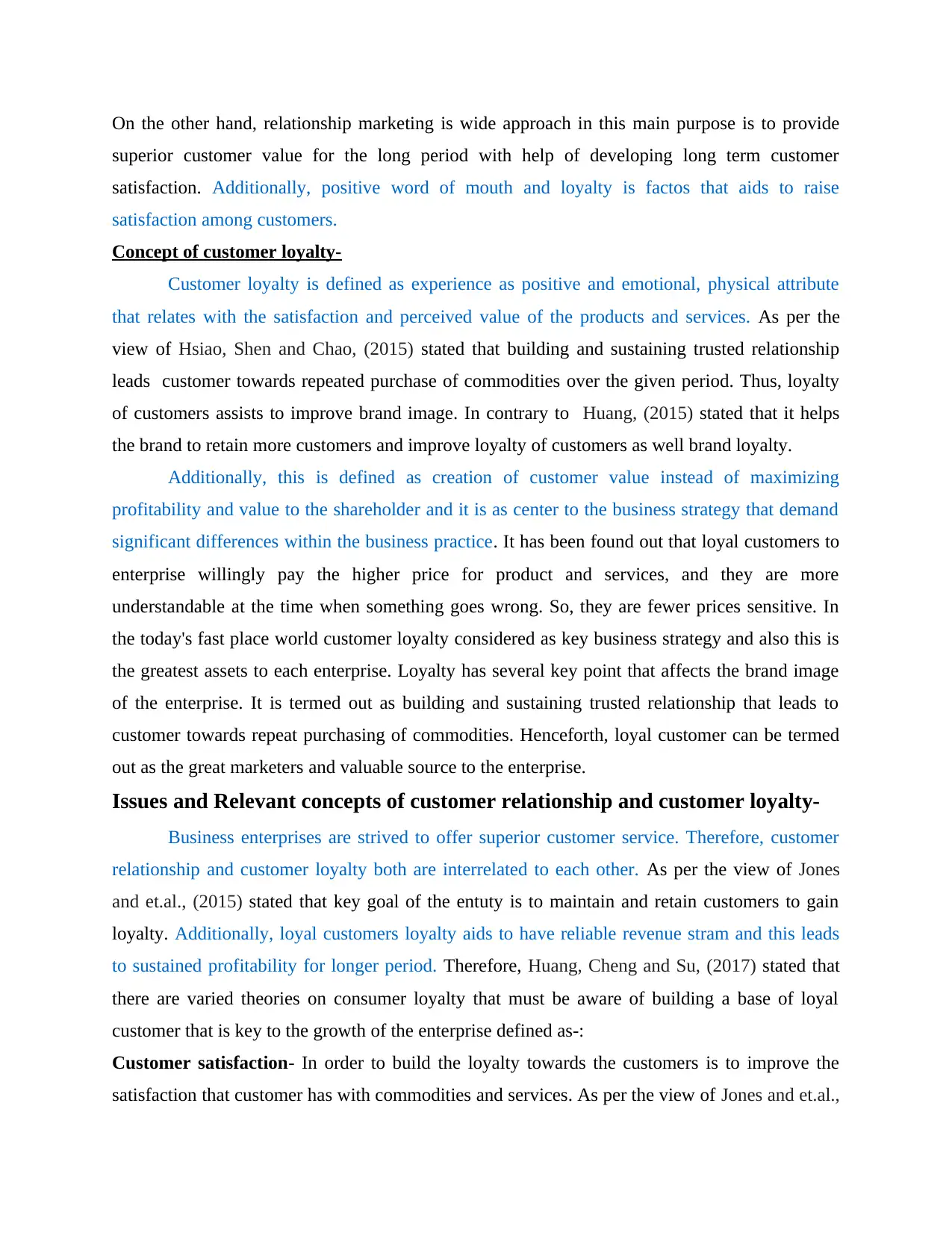
On the other hand, relationship marketing is wide approach in this main purpose is to provide
superior customer value for the long period with help of developing long term customer
satisfaction. Additionally, positive word of mouth and loyalty is factos that aids to raise
satisfaction among customers.
Concept of customer loyalty-
Customer loyalty is defined as experience as positive and emotional, physical attribute
that relates with the satisfaction and perceived value of the products and services. As per the
view of Hsiao, Shen and Chao, (2015) stated that building and sustaining trusted relationship
leads customer towards repeated purchase of commodities over the given period. Thus, loyalty
of customers assists to improve brand image. In contrary to Huang, (2015) stated that it helps
the brand to retain more customers and improve loyalty of customers as well brand loyalty.
Additionally, this is defined as creation of customer value instead of maximizing
profitability and value to the shareholder and it is as center to the business strategy that demand
significant differences within the business practice. It has been found out that loyal customers to
enterprise willingly pay the higher price for product and services, and they are more
understandable at the time when something goes wrong. So, they are fewer prices sensitive. In
the today's fast place world customer loyalty considered as key business strategy and also this is
the greatest assets to each enterprise. Loyalty has several key point that affects the brand image
of the enterprise. It is termed out as building and sustaining trusted relationship that leads to
customer towards repeat purchasing of commodities. Henceforth, loyal customer can be termed
out as the great marketers and valuable source to the enterprise.
Issues and Relevant concepts of customer relationship and customer loyalty-
Business enterprises are strived to offer superior customer service. Therefore, customer
relationship and customer loyalty both are interrelated to each other. As per the view of Jones
and et.al., (2015) stated that key goal of the entuty is to maintain and retain customers to gain
loyalty. Additionally, loyal customers loyalty aids to have reliable revenue stram and this leads
to sustained profitability for longer period. Therefore, Huang, Cheng and Su, (2017) stated that
there are varied theories on consumer loyalty that must be aware of building a base of loyal
customer that is key to the growth of the enterprise defined as-:
Customer satisfaction- In order to build the loyalty towards the customers is to improve the
satisfaction that customer has with commodities and services. As per the view of Jones and et.al.,
superior customer value for the long period with help of developing long term customer
satisfaction. Additionally, positive word of mouth and loyalty is factos that aids to raise
satisfaction among customers.
Concept of customer loyalty-
Customer loyalty is defined as experience as positive and emotional, physical attribute
that relates with the satisfaction and perceived value of the products and services. As per the
view of Hsiao, Shen and Chao, (2015) stated that building and sustaining trusted relationship
leads customer towards repeated purchase of commodities over the given period. Thus, loyalty
of customers assists to improve brand image. In contrary to Huang, (2015) stated that it helps
the brand to retain more customers and improve loyalty of customers as well brand loyalty.
Additionally, this is defined as creation of customer value instead of maximizing
profitability and value to the shareholder and it is as center to the business strategy that demand
significant differences within the business practice. It has been found out that loyal customers to
enterprise willingly pay the higher price for product and services, and they are more
understandable at the time when something goes wrong. So, they are fewer prices sensitive. In
the today's fast place world customer loyalty considered as key business strategy and also this is
the greatest assets to each enterprise. Loyalty has several key point that affects the brand image
of the enterprise. It is termed out as building and sustaining trusted relationship that leads to
customer towards repeat purchasing of commodities. Henceforth, loyal customer can be termed
out as the great marketers and valuable source to the enterprise.
Issues and Relevant concepts of customer relationship and customer loyalty-
Business enterprises are strived to offer superior customer service. Therefore, customer
relationship and customer loyalty both are interrelated to each other. As per the view of Jones
and et.al., (2015) stated that key goal of the entuty is to maintain and retain customers to gain
loyalty. Additionally, loyal customers loyalty aids to have reliable revenue stram and this leads
to sustained profitability for longer period. Therefore, Huang, Cheng and Su, (2017) stated that
there are varied theories on consumer loyalty that must be aware of building a base of loyal
customer that is key to the growth of the enterprise defined as-:
Customer satisfaction- In order to build the loyalty towards the customers is to improve the
satisfaction that customer has with commodities and services. As per the view of Jones and et.al.,
Paraphrase This Document
Need a fresh take? Get an instant paraphrase of this document with our AI Paraphraser
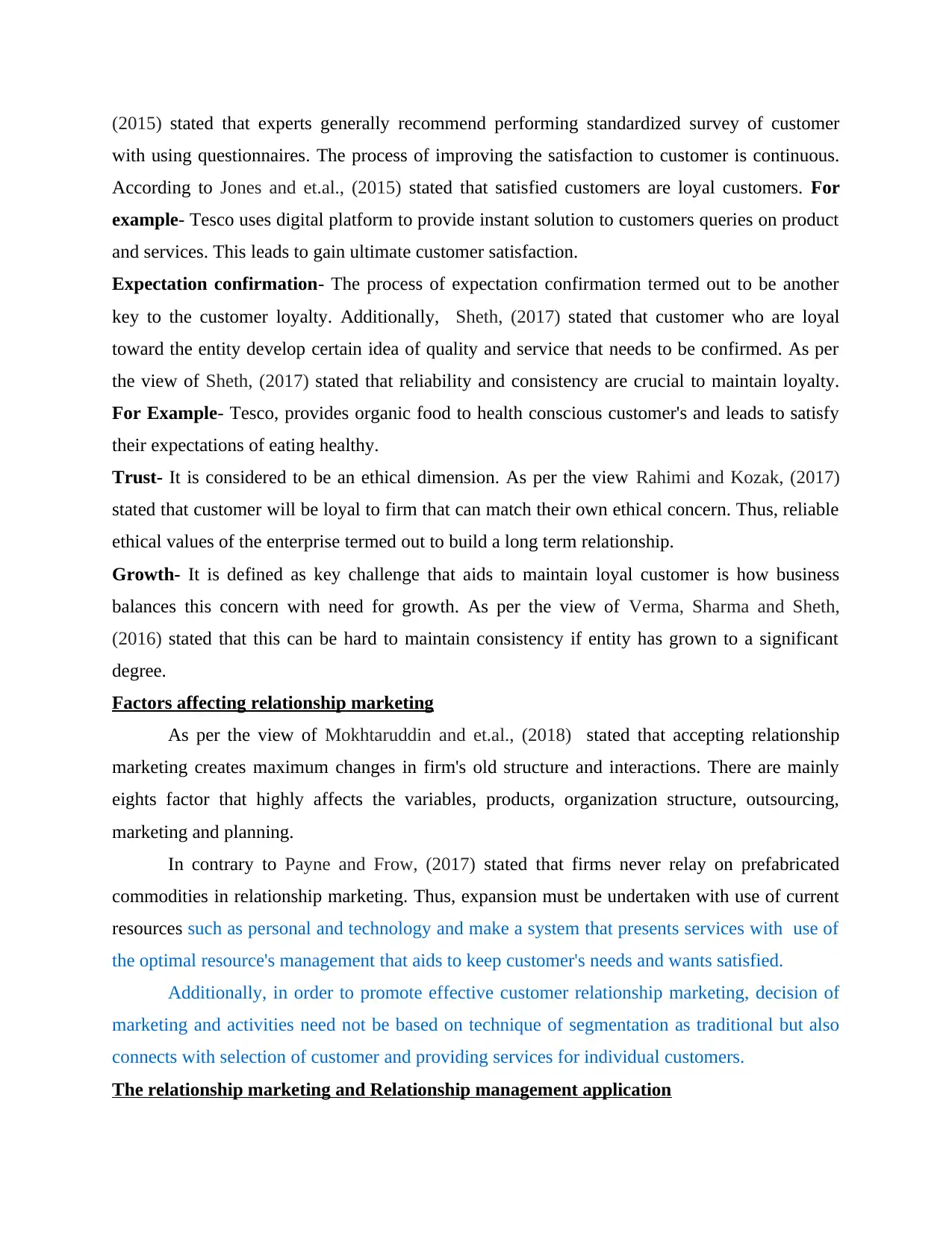
(2015) stated that experts generally recommend performing standardized survey of customer
with using questionnaires. The process of improving the satisfaction to customer is continuous.
According to Jones and et.al., (2015) stated that satisfied customers are loyal customers. For
example- Tesco uses digital platform to provide instant solution to customers queries on product
and services. This leads to gain ultimate customer satisfaction.
Expectation confirmation- The process of expectation confirmation termed out to be another
key to the customer loyalty. Additionally, Sheth, (2017) stated that customer who are loyal
toward the entity develop certain idea of quality and service that needs to be confirmed. As per
the view of Sheth, (2017) stated that reliability and consistency are crucial to maintain loyalty.
For Example- Tesco, provides organic food to health conscious customer's and leads to satisfy
their expectations of eating healthy.
Trust- It is considered to be an ethical dimension. As per the view Rahimi and Kozak, (2017)
stated that customer will be loyal to firm that can match their own ethical concern. Thus, reliable
ethical values of the enterprise termed out to build a long term relationship.
Growth- It is defined as key challenge that aids to maintain loyal customer is how business
balances this concern with need for growth. As per the view of Verma, Sharma and Sheth,
(2016) stated that this can be hard to maintain consistency if entity has grown to a significant
degree.
Factors affecting relationship marketing
As per the view of Mokhtaruddin and et.al., (2018) stated that accepting relationship
marketing creates maximum changes in firm's old structure and interactions. There are mainly
eights factor that highly affects the variables, products, organization structure, outsourcing,
marketing and planning.
In contrary to Payne and Frow, (2017) stated that firms never relay on prefabricated
commodities in relationship marketing. Thus, expansion must be undertaken with use of current
resources such as personal and technology and make a system that presents services with use of
the optimal resource's management that aids to keep customer's needs and wants satisfied.
Additionally, in order to promote effective customer relationship marketing, decision of
marketing and activities need not be based on technique of segmentation as traditional but also
connects with selection of customer and providing services for individual customers.
The relationship marketing and Relationship management application
with using questionnaires. The process of improving the satisfaction to customer is continuous.
According to Jones and et.al., (2015) stated that satisfied customers are loyal customers. For
example- Tesco uses digital platform to provide instant solution to customers queries on product
and services. This leads to gain ultimate customer satisfaction.
Expectation confirmation- The process of expectation confirmation termed out to be another
key to the customer loyalty. Additionally, Sheth, (2017) stated that customer who are loyal
toward the entity develop certain idea of quality and service that needs to be confirmed. As per
the view of Sheth, (2017) stated that reliability and consistency are crucial to maintain loyalty.
For Example- Tesco, provides organic food to health conscious customer's and leads to satisfy
their expectations of eating healthy.
Trust- It is considered to be an ethical dimension. As per the view Rahimi and Kozak, (2017)
stated that customer will be loyal to firm that can match their own ethical concern. Thus, reliable
ethical values of the enterprise termed out to build a long term relationship.
Growth- It is defined as key challenge that aids to maintain loyal customer is how business
balances this concern with need for growth. As per the view of Verma, Sharma and Sheth,
(2016) stated that this can be hard to maintain consistency if entity has grown to a significant
degree.
Factors affecting relationship marketing
As per the view of Mokhtaruddin and et.al., (2018) stated that accepting relationship
marketing creates maximum changes in firm's old structure and interactions. There are mainly
eights factor that highly affects the variables, products, organization structure, outsourcing,
marketing and planning.
In contrary to Payne and Frow, (2017) stated that firms never relay on prefabricated
commodities in relationship marketing. Thus, expansion must be undertaken with use of current
resources such as personal and technology and make a system that presents services with use of
the optimal resource's management that aids to keep customer's needs and wants satisfied.
Additionally, in order to promote effective customer relationship marketing, decision of
marketing and activities need not be based on technique of segmentation as traditional but also
connects with selection of customer and providing services for individual customers.
The relationship marketing and Relationship management application
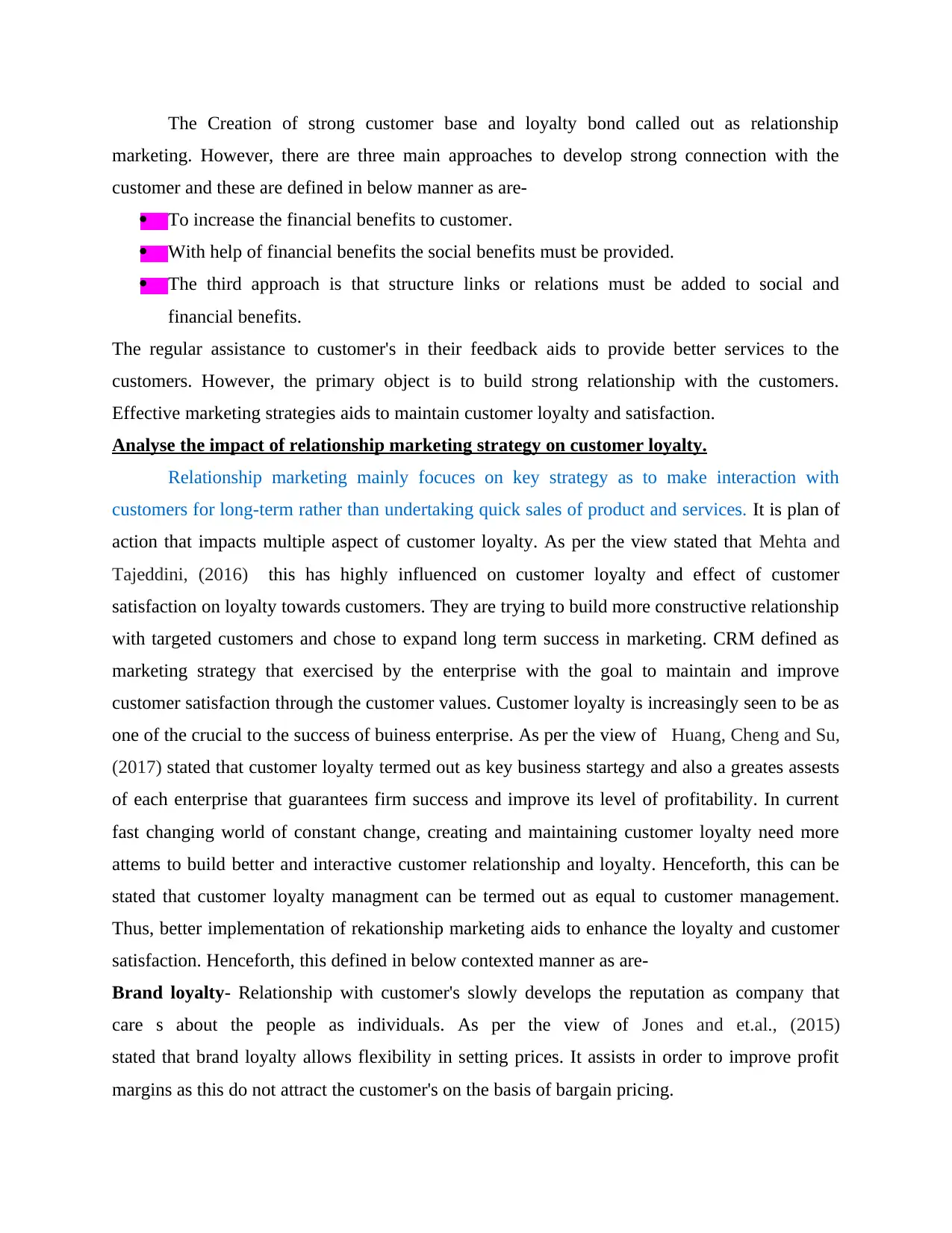
The Creation of strong customer base and loyalty bond called out as relationship
marketing. However, there are three main approaches to develop strong connection with the
customer and these are defined in below manner as are-
To increase the financial benefits to customer.
With help of financial benefits the social benefits must be provided.
The third approach is that structure links or relations must be added to social and
financial benefits.
The regular assistance to customer's in their feedback aids to provide better services to the
customers. However, the primary object is to build strong relationship with the customers.
Effective marketing strategies aids to maintain customer loyalty and satisfaction.
Analyse the impact of relationship marketing strategy on customer loyalty.
Relationship marketing mainly focuces on key strategy as to make interaction with
customers for long-term rather than undertaking quick sales of product and services. It is plan of
action that impacts multiple aspect of customer loyalty. As per the view stated that Mehta and
Tajeddini, (2016) this has highly influenced on customer loyalty and effect of customer
satisfaction on loyalty towards customers. They are trying to build more constructive relationship
with targeted customers and chose to expand long term success in marketing. CRM defined as
marketing strategy that exercised by the enterprise with the goal to maintain and improve
customer satisfaction through the customer values. Customer loyalty is increasingly seen to be as
one of the crucial to the success of buiness enterprise. As per the view of Huang, Cheng and Su,
(2017) stated that customer loyalty termed out as key business startegy and also a greates assests
of each enterprise that guarantees firm success and improve its level of profitability. In current
fast changing world of constant change, creating and maintaining customer loyalty need more
attems to build better and interactive customer relationship and loyalty. Henceforth, this can be
stated that customer loyalty managment can be termed out as equal to customer management.
Thus, better implementation of rekationship marketing aids to enhance the loyalty and customer
satisfaction. Henceforth, this defined in below contexted manner as are-
Brand loyalty- Relationship with customer's slowly develops the reputation as company that
care s about the people as individuals. As per the view of Jones and et.al., (2015)
stated that brand loyalty allows flexibility in setting prices. It assists in order to improve profit
margins as this do not attract the customer's on the basis of bargain pricing.
marketing. However, there are three main approaches to develop strong connection with the
customer and these are defined in below manner as are-
To increase the financial benefits to customer.
With help of financial benefits the social benefits must be provided.
The third approach is that structure links or relations must be added to social and
financial benefits.
The regular assistance to customer's in their feedback aids to provide better services to the
customers. However, the primary object is to build strong relationship with the customers.
Effective marketing strategies aids to maintain customer loyalty and satisfaction.
Analyse the impact of relationship marketing strategy on customer loyalty.
Relationship marketing mainly focuces on key strategy as to make interaction with
customers for long-term rather than undertaking quick sales of product and services. It is plan of
action that impacts multiple aspect of customer loyalty. As per the view stated that Mehta and
Tajeddini, (2016) this has highly influenced on customer loyalty and effect of customer
satisfaction on loyalty towards customers. They are trying to build more constructive relationship
with targeted customers and chose to expand long term success in marketing. CRM defined as
marketing strategy that exercised by the enterprise with the goal to maintain and improve
customer satisfaction through the customer values. Customer loyalty is increasingly seen to be as
one of the crucial to the success of buiness enterprise. As per the view of Huang, Cheng and Su,
(2017) stated that customer loyalty termed out as key business startegy and also a greates assests
of each enterprise that guarantees firm success and improve its level of profitability. In current
fast changing world of constant change, creating and maintaining customer loyalty need more
attems to build better and interactive customer relationship and loyalty. Henceforth, this can be
stated that customer loyalty managment can be termed out as equal to customer management.
Thus, better implementation of rekationship marketing aids to enhance the loyalty and customer
satisfaction. Henceforth, this defined in below contexted manner as are-
Brand loyalty- Relationship with customer's slowly develops the reputation as company that
care s about the people as individuals. As per the view of Jones and et.al., (2015)
stated that brand loyalty allows flexibility in setting prices. It assists in order to improve profit
margins as this do not attract the customer's on the basis of bargain pricing.
⊘ This is a preview!⊘
Do you want full access?
Subscribe today to unlock all pages.

Trusted by 1+ million students worldwide
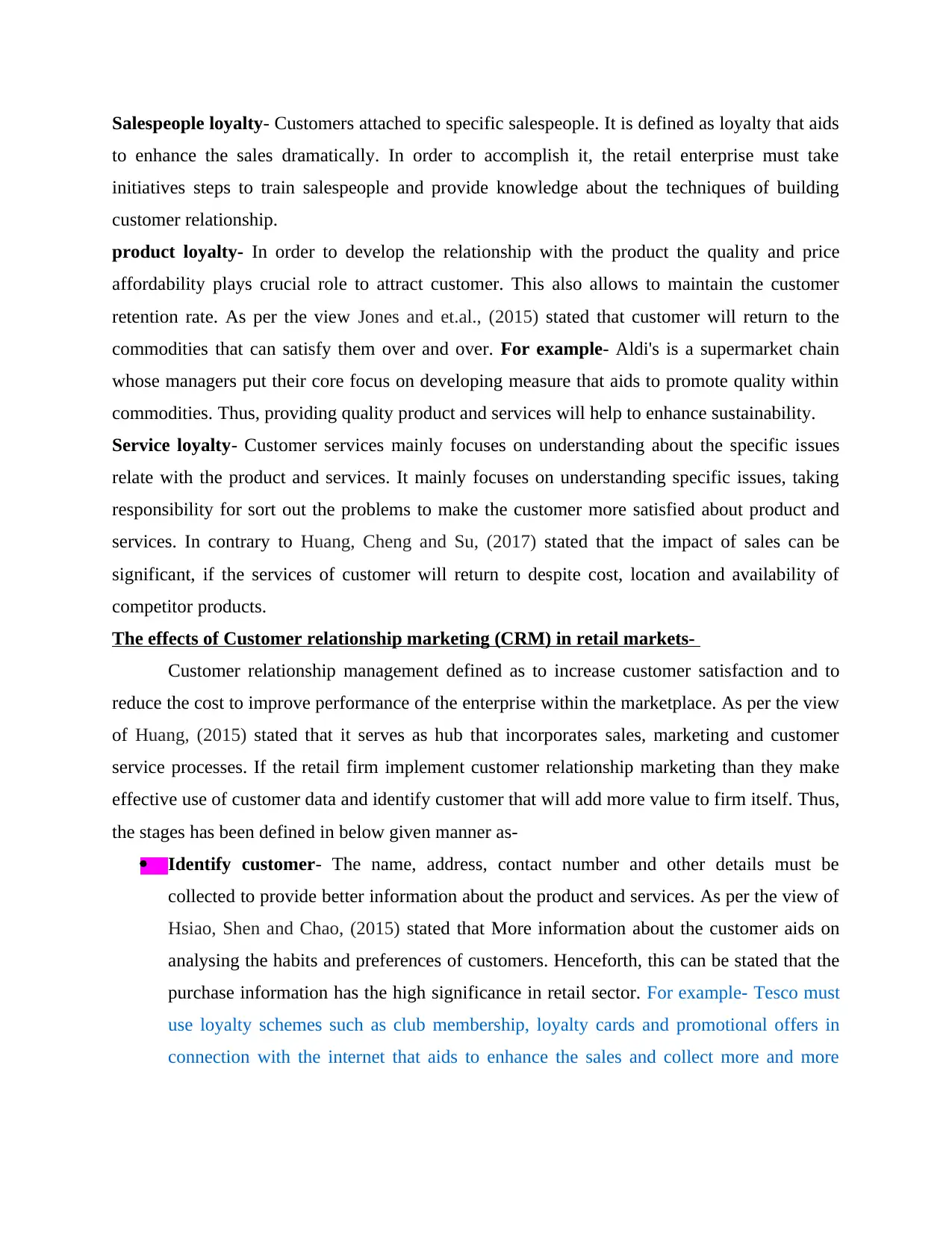
Salespeople loyalty- Customers attached to specific salespeople. It is defined as loyalty that aids
to enhance the sales dramatically. In order to accomplish it, the retail enterprise must take
initiatives steps to train salespeople and provide knowledge about the techniques of building
customer relationship.
product loyalty- In order to develop the relationship with the product the quality and price
affordability plays crucial role to attract customer. This also allows to maintain the customer
retention rate. As per the view Jones and et.al., (2015) stated that customer will return to the
commodities that can satisfy them over and over. For example- Aldi's is a supermarket chain
whose managers put their core focus on developing measure that aids to promote quality within
commodities. Thus, providing quality product and services will help to enhance sustainability.
Service loyalty- Customer services mainly focuses on understanding about the specific issues
relate with the product and services. It mainly focuses on understanding specific issues, taking
responsibility for sort out the problems to make the customer more satisfied about product and
services. In contrary to Huang, Cheng and Su, (2017) stated that the impact of sales can be
significant, if the services of customer will return to despite cost, location and availability of
competitor products.
The effects of Customer relationship marketing (CRM) in retail markets-
Customer relationship management defined as to increase customer satisfaction and to
reduce the cost to improve performance of the enterprise within the marketplace. As per the view
of Huang, (2015) stated that it serves as hub that incorporates sales, marketing and customer
service processes. If the retail firm implement customer relationship marketing than they make
effective use of customer data and identify customer that will add more value to firm itself. Thus,
the stages has been defined in below given manner as-
Identify customer- The name, address, contact number and other details must be
collected to provide better information about the product and services. As per the view of
Hsiao, Shen and Chao, (2015) stated that More information about the customer aids on
analysing the habits and preferences of customers. Henceforth, this can be stated that the
purchase information has the high significance in retail sector. For example- Tesco must
use loyalty schemes such as club membership, loyalty cards and promotional offers in
connection with the internet that aids to enhance the sales and collect more and more
to enhance the sales dramatically. In order to accomplish it, the retail enterprise must take
initiatives steps to train salespeople and provide knowledge about the techniques of building
customer relationship.
product loyalty- In order to develop the relationship with the product the quality and price
affordability plays crucial role to attract customer. This also allows to maintain the customer
retention rate. As per the view Jones and et.al., (2015) stated that customer will return to the
commodities that can satisfy them over and over. For example- Aldi's is a supermarket chain
whose managers put their core focus on developing measure that aids to promote quality within
commodities. Thus, providing quality product and services will help to enhance sustainability.
Service loyalty- Customer services mainly focuses on understanding about the specific issues
relate with the product and services. It mainly focuses on understanding specific issues, taking
responsibility for sort out the problems to make the customer more satisfied about product and
services. In contrary to Huang, Cheng and Su, (2017) stated that the impact of sales can be
significant, if the services of customer will return to despite cost, location and availability of
competitor products.
The effects of Customer relationship marketing (CRM) in retail markets-
Customer relationship management defined as to increase customer satisfaction and to
reduce the cost to improve performance of the enterprise within the marketplace. As per the view
of Huang, (2015) stated that it serves as hub that incorporates sales, marketing and customer
service processes. If the retail firm implement customer relationship marketing than they make
effective use of customer data and identify customer that will add more value to firm itself. Thus,
the stages has been defined in below given manner as-
Identify customer- The name, address, contact number and other details must be
collected to provide better information about the product and services. As per the view of
Hsiao, Shen and Chao, (2015) stated that More information about the customer aids on
analysing the habits and preferences of customers. Henceforth, this can be stated that the
purchase information has the high significance in retail sector. For example- Tesco must
use loyalty schemes such as club membership, loyalty cards and promotional offers in
connection with the internet that aids to enhance the sales and collect more and more
Paraphrase This Document
Need a fresh take? Get an instant paraphrase of this document with our AI Paraphraser
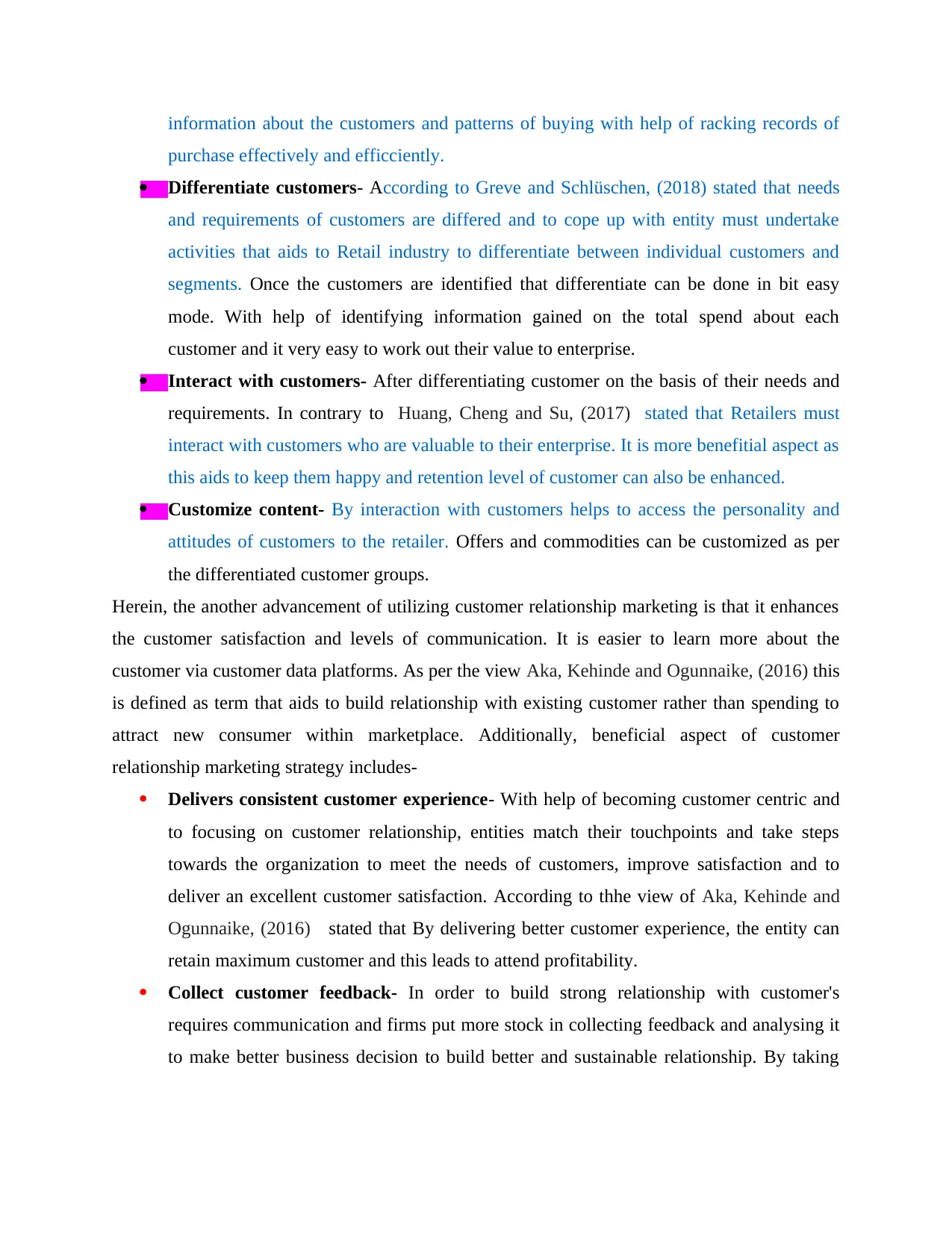
information about the customers and patterns of buying with help of racking records of
purchase effectively and efficciently.
Differentiate customers- According to Greve and Schlüschen, (2018) stated that needs
and requirements of customers are differed and to cope up with entity must undertake
activities that aids to Retail industry to differentiate between individual customers and
segments. Once the customers are identified that differentiate can be done in bit easy
mode. With help of identifying information gained on the total spend about each
customer and it very easy to work out their value to enterprise.
Interact with customers- After differentiating customer on the basis of their needs and
requirements. In contrary to Huang, Cheng and Su, (2017) stated that Retailers must
interact with customers who are valuable to their enterprise. It is more benefitial aspect as
this aids to keep them happy and retention level of customer can also be enhanced.
Customize content- By interaction with customers helps to access the personality and
attitudes of customers to the retailer. Offers and commodities can be customized as per
the differentiated customer groups.
Herein, the another advancement of utilizing customer relationship marketing is that it enhances
the customer satisfaction and levels of communication. It is easier to learn more about the
customer via customer data platforms. As per the view Aka, Kehinde and Ogunnaike, (2016) this
is defined as term that aids to build relationship with existing customer rather than spending to
attract new consumer within marketplace. Additionally, beneficial aspect of customer
relationship marketing strategy includes-
Delivers consistent customer experience- With help of becoming customer centric and
to focusing on customer relationship, entities match their touchpoints and take steps
towards the organization to meet the needs of customers, improve satisfaction and to
deliver an excellent customer satisfaction. According to thhe view of Aka, Kehinde and
Ogunnaike, (2016) stated that By delivering better customer experience, the entity can
retain maximum customer and this leads to attend profitability.
Collect customer feedback- In order to build strong relationship with customer's
requires communication and firms put more stock in collecting feedback and analysing it
to make better business decision to build better and sustainable relationship. By taking
purchase effectively and efficciently.
Differentiate customers- According to Greve and Schlüschen, (2018) stated that needs
and requirements of customers are differed and to cope up with entity must undertake
activities that aids to Retail industry to differentiate between individual customers and
segments. Once the customers are identified that differentiate can be done in bit easy
mode. With help of identifying information gained on the total spend about each
customer and it very easy to work out their value to enterprise.
Interact with customers- After differentiating customer on the basis of their needs and
requirements. In contrary to Huang, Cheng and Su, (2017) stated that Retailers must
interact with customers who are valuable to their enterprise. It is more benefitial aspect as
this aids to keep them happy and retention level of customer can also be enhanced.
Customize content- By interaction with customers helps to access the personality and
attitudes of customers to the retailer. Offers and commodities can be customized as per
the differentiated customer groups.
Herein, the another advancement of utilizing customer relationship marketing is that it enhances
the customer satisfaction and levels of communication. It is easier to learn more about the
customer via customer data platforms. As per the view Aka, Kehinde and Ogunnaike, (2016) this
is defined as term that aids to build relationship with existing customer rather than spending to
attract new consumer within marketplace. Additionally, beneficial aspect of customer
relationship marketing strategy includes-
Delivers consistent customer experience- With help of becoming customer centric and
to focusing on customer relationship, entities match their touchpoints and take steps
towards the organization to meet the needs of customers, improve satisfaction and to
deliver an excellent customer satisfaction. According to thhe view of Aka, Kehinde and
Ogunnaike, (2016) stated that By delivering better customer experience, the entity can
retain maximum customer and this leads to attend profitability.
Collect customer feedback- In order to build strong relationship with customer's
requires communication and firms put more stock in collecting feedback and analysing it
to make better business decision to build better and sustainable relationship. By taking
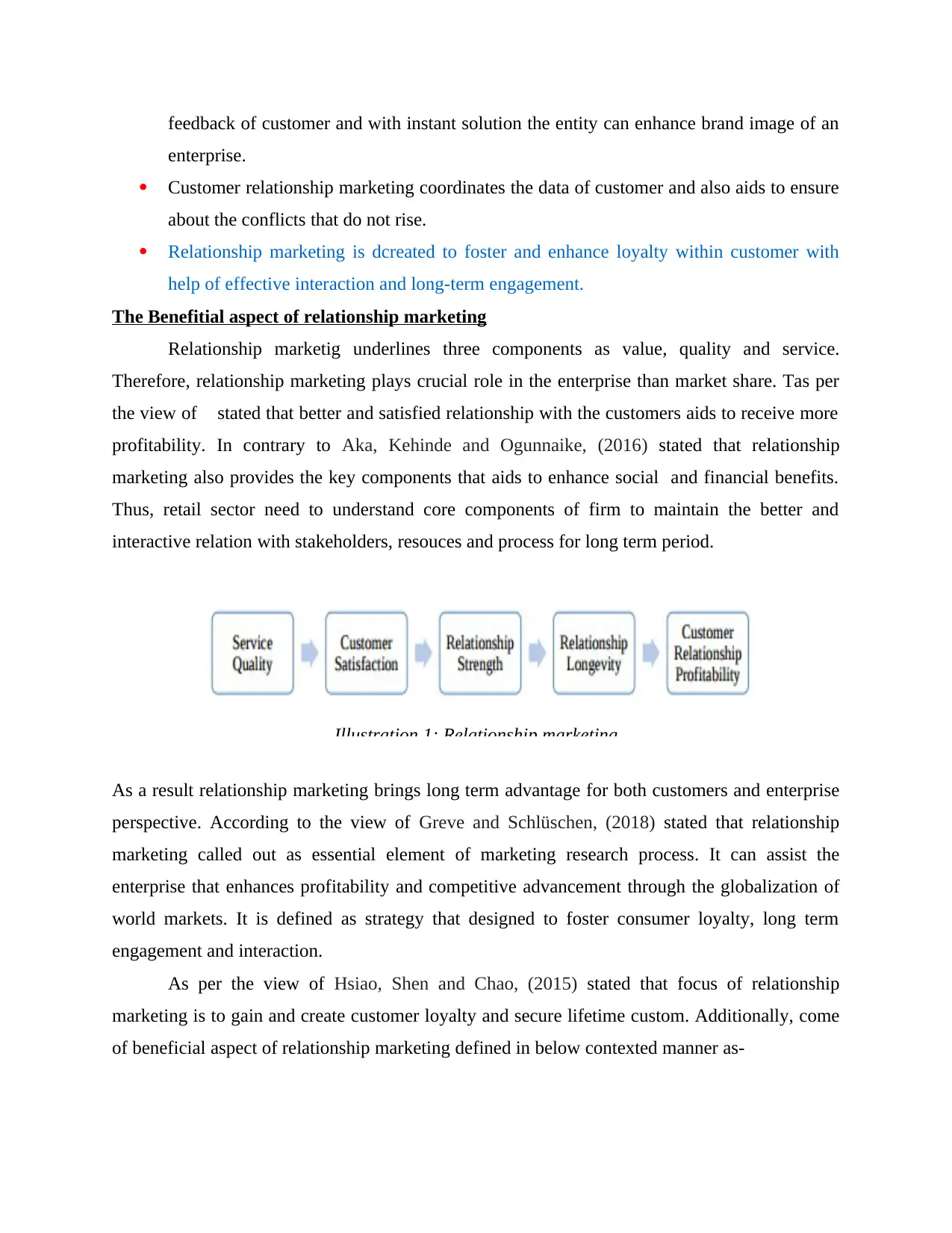
feedback of customer and with instant solution the entity can enhance brand image of an
enterprise.
Customer relationship marketing coordinates the data of customer and also aids to ensure
about the conflicts that do not rise.
Relationship marketing is dcreated to foster and enhance loyalty within customer with
help of effective interaction and long-term engagement.
The Benefitial aspect of relationship marketing
Relationship marketig underlines three components as value, quality and service.
Therefore, relationship marketing plays crucial role in the enterprise than market share. Tas per
the view of stated that better and satisfied relationship with the customers aids to receive more
profitability. In contrary to Aka, Kehinde and Ogunnaike, (2016) stated that relationship
marketing also provides the key components that aids to enhance social and financial benefits.
Thus, retail sector need to understand core components of firm to maintain the better and
interactive relation with stakeholders, resouces and process for long term period.
As a result relationship marketing brings long term advantage for both customers and enterprise
perspective. According to the view of Greve and Schlüschen, (2018) stated that relationship
marketing called out as essential element of marketing research process. It can assist the
enterprise that enhances profitability and competitive advancement through the globalization of
world markets. It is defined as strategy that designed to foster consumer loyalty, long term
engagement and interaction.
As per the view of Hsiao, Shen and Chao, (2015) stated that focus of relationship
marketing is to gain and create customer loyalty and secure lifetime custom. Additionally, come
of beneficial aspect of relationship marketing defined in below contexted manner as-
Illustration 1: Relationship marketing
enterprise.
Customer relationship marketing coordinates the data of customer and also aids to ensure
about the conflicts that do not rise.
Relationship marketing is dcreated to foster and enhance loyalty within customer with
help of effective interaction and long-term engagement.
The Benefitial aspect of relationship marketing
Relationship marketig underlines three components as value, quality and service.
Therefore, relationship marketing plays crucial role in the enterprise than market share. Tas per
the view of stated that better and satisfied relationship with the customers aids to receive more
profitability. In contrary to Aka, Kehinde and Ogunnaike, (2016) stated that relationship
marketing also provides the key components that aids to enhance social and financial benefits.
Thus, retail sector need to understand core components of firm to maintain the better and
interactive relation with stakeholders, resouces and process for long term period.
As a result relationship marketing brings long term advantage for both customers and enterprise
perspective. According to the view of Greve and Schlüschen, (2018) stated that relationship
marketing called out as essential element of marketing research process. It can assist the
enterprise that enhances profitability and competitive advancement through the globalization of
world markets. It is defined as strategy that designed to foster consumer loyalty, long term
engagement and interaction.
As per the view of Hsiao, Shen and Chao, (2015) stated that focus of relationship
marketing is to gain and create customer loyalty and secure lifetime custom. Additionally, come
of beneficial aspect of relationship marketing defined in below contexted manner as-
Illustration 1: Relationship marketing
⊘ This is a preview!⊘
Do you want full access?
Subscribe today to unlock all pages.

Trusted by 1+ million students worldwide
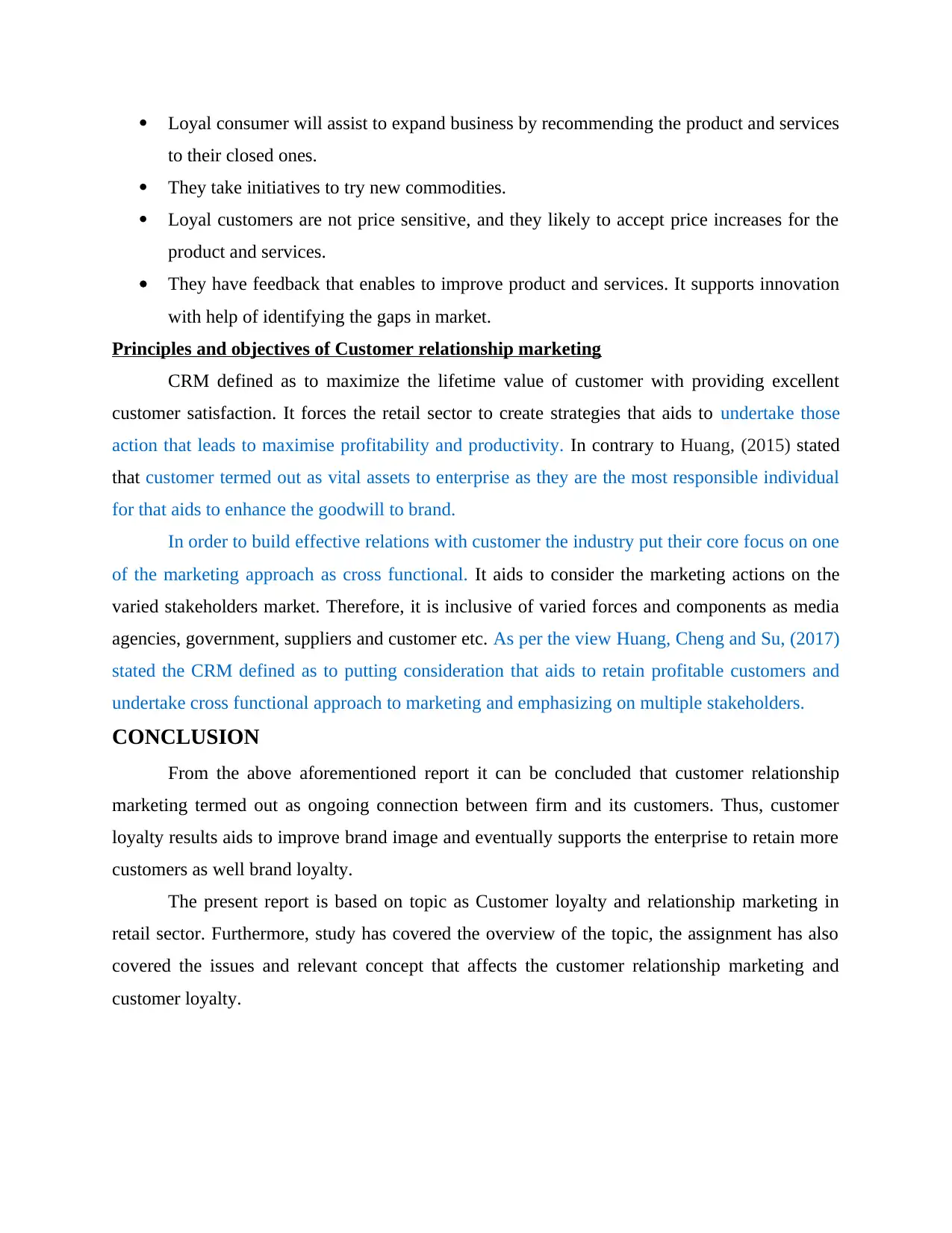
Loyal consumer will assist to expand business by recommending the product and services
to their closed ones.
They take initiatives to try new commodities.
Loyal customers are not price sensitive, and they likely to accept price increases for the
product and services.
They have feedback that enables to improve product and services. It supports innovation
with help of identifying the gaps in market.
Principles and objectives of Customer relationship marketing
CRM defined as to maximize the lifetime value of customer with providing excellent
customer satisfaction. It forces the retail sector to create strategies that aids to undertake those
action that leads to maximise profitability and productivity. In contrary to Huang, (2015) stated
that customer termed out as vital assets to enterprise as they are the most responsible individual
for that aids to enhance the goodwill to brand.
In order to build effective relations with customer the industry put their core focus on one
of the marketing approach as cross functional. It aids to consider the marketing actions on the
varied stakeholders market. Therefore, it is inclusive of varied forces and components as media
agencies, government, suppliers and customer etc. As per the view Huang, Cheng and Su, (2017)
stated the CRM defined as to putting consideration that aids to retain profitable customers and
undertake cross functional approach to marketing and emphasizing on multiple stakeholders.
CONCLUSION
From the above aforementioned report it can be concluded that customer relationship
marketing termed out as ongoing connection between firm and its customers. Thus, customer
loyalty results aids to improve brand image and eventually supports the enterprise to retain more
customers as well brand loyalty.
The present report is based on topic as Customer loyalty and relationship marketing in
retail sector. Furthermore, study has covered the overview of the topic, the assignment has also
covered the issues and relevant concept that affects the customer relationship marketing and
customer loyalty.
to their closed ones.
They take initiatives to try new commodities.
Loyal customers are not price sensitive, and they likely to accept price increases for the
product and services.
They have feedback that enables to improve product and services. It supports innovation
with help of identifying the gaps in market.
Principles and objectives of Customer relationship marketing
CRM defined as to maximize the lifetime value of customer with providing excellent
customer satisfaction. It forces the retail sector to create strategies that aids to undertake those
action that leads to maximise profitability and productivity. In contrary to Huang, (2015) stated
that customer termed out as vital assets to enterprise as they are the most responsible individual
for that aids to enhance the goodwill to brand.
In order to build effective relations with customer the industry put their core focus on one
of the marketing approach as cross functional. It aids to consider the marketing actions on the
varied stakeholders market. Therefore, it is inclusive of varied forces and components as media
agencies, government, suppliers and customer etc. As per the view Huang, Cheng and Su, (2017)
stated the CRM defined as to putting consideration that aids to retain profitable customers and
undertake cross functional approach to marketing and emphasizing on multiple stakeholders.
CONCLUSION
From the above aforementioned report it can be concluded that customer relationship
marketing termed out as ongoing connection between firm and its customers. Thus, customer
loyalty results aids to improve brand image and eventually supports the enterprise to retain more
customers as well brand loyalty.
The present report is based on topic as Customer loyalty and relationship marketing in
retail sector. Furthermore, study has covered the overview of the topic, the assignment has also
covered the issues and relevant concept that affects the customer relationship marketing and
customer loyalty.
Paraphrase This Document
Need a fresh take? Get an instant paraphrase of this document with our AI Paraphraser
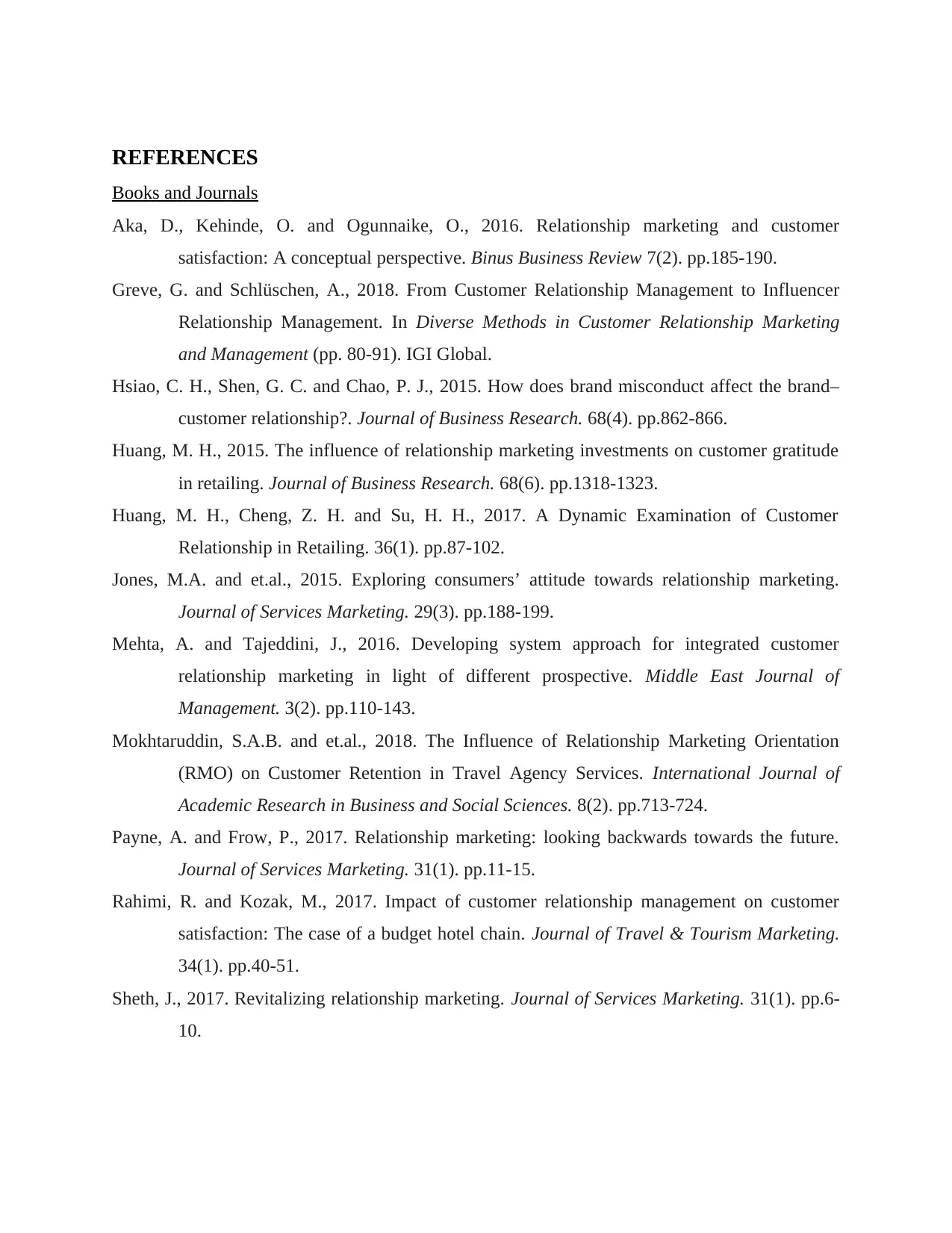
REFERENCES
Books and Journals
Aka, D., Kehinde, O. and Ogunnaike, O., 2016. Relationship marketing and customer
satisfaction: A conceptual perspective. Binus Business Review 7(2). pp.185-190.
Greve, G. and Schlüschen, A., 2018. From Customer Relationship Management to Influencer
Relationship Management. In Diverse Methods in Customer Relationship Marketing
and Management (pp. 80-91). IGI Global.
Hsiao, C. H., Shen, G. C. and Chao, P. J., 2015. How does brand misconduct affect the brand–
customer relationship?. Journal of Business Research. 68(4). pp.862-866.
Huang, M. H., 2015. The influence of relationship marketing investments on customer gratitude
in retailing. Journal of Business Research. 68(6). pp.1318-1323.
Huang, M. H., Cheng, Z. H. and Su, H. H., 2017. A Dynamic Examination of Customer
Relationship in Retailing. 36(1). pp.87-102.
Jones, M.A. and et.al., 2015. Exploring consumers’ attitude towards relationship marketing.
Journal of Services Marketing. 29(3). pp.188-199.
Mehta, A. and Tajeddini, J., 2016. Developing system approach for integrated customer
relationship marketing in light of different prospective. Middle East Journal of
Management. 3(2). pp.110-143.
Mokhtaruddin, S.A.B. and et.al., 2018. The Influence of Relationship Marketing Orientation
(RMO) on Customer Retention in Travel Agency Services. International Journal of
Academic Research in Business and Social Sciences. 8(2). pp.713-724.
Payne, A. and Frow, P., 2017. Relationship marketing: looking backwards towards the future.
Journal of Services Marketing. 31(1). pp.11-15.
Rahimi, R. and Kozak, M., 2017. Impact of customer relationship management on customer
satisfaction: The case of a budget hotel chain. Journal of Travel & Tourism Marketing.
34(1). pp.40-51.
Sheth, J., 2017. Revitalizing relationship marketing. Journal of Services Marketing. 31(1). pp.6-
10.
Books and Journals
Aka, D., Kehinde, O. and Ogunnaike, O., 2016. Relationship marketing and customer
satisfaction: A conceptual perspective. Binus Business Review 7(2). pp.185-190.
Greve, G. and Schlüschen, A., 2018. From Customer Relationship Management to Influencer
Relationship Management. In Diverse Methods in Customer Relationship Marketing
and Management (pp. 80-91). IGI Global.
Hsiao, C. H., Shen, G. C. and Chao, P. J., 2015. How does brand misconduct affect the brand–
customer relationship?. Journal of Business Research. 68(4). pp.862-866.
Huang, M. H., 2015. The influence of relationship marketing investments on customer gratitude
in retailing. Journal of Business Research. 68(6). pp.1318-1323.
Huang, M. H., Cheng, Z. H. and Su, H. H., 2017. A Dynamic Examination of Customer
Relationship in Retailing. 36(1). pp.87-102.
Jones, M.A. and et.al., 2015. Exploring consumers’ attitude towards relationship marketing.
Journal of Services Marketing. 29(3). pp.188-199.
Mehta, A. and Tajeddini, J., 2016. Developing system approach for integrated customer
relationship marketing in light of different prospective. Middle East Journal of
Management. 3(2). pp.110-143.
Mokhtaruddin, S.A.B. and et.al., 2018. The Influence of Relationship Marketing Orientation
(RMO) on Customer Retention in Travel Agency Services. International Journal of
Academic Research in Business and Social Sciences. 8(2). pp.713-724.
Payne, A. and Frow, P., 2017. Relationship marketing: looking backwards towards the future.
Journal of Services Marketing. 31(1). pp.11-15.
Rahimi, R. and Kozak, M., 2017. Impact of customer relationship management on customer
satisfaction: The case of a budget hotel chain. Journal of Travel & Tourism Marketing.
34(1). pp.40-51.
Sheth, J., 2017. Revitalizing relationship marketing. Journal of Services Marketing. 31(1). pp.6-
10.
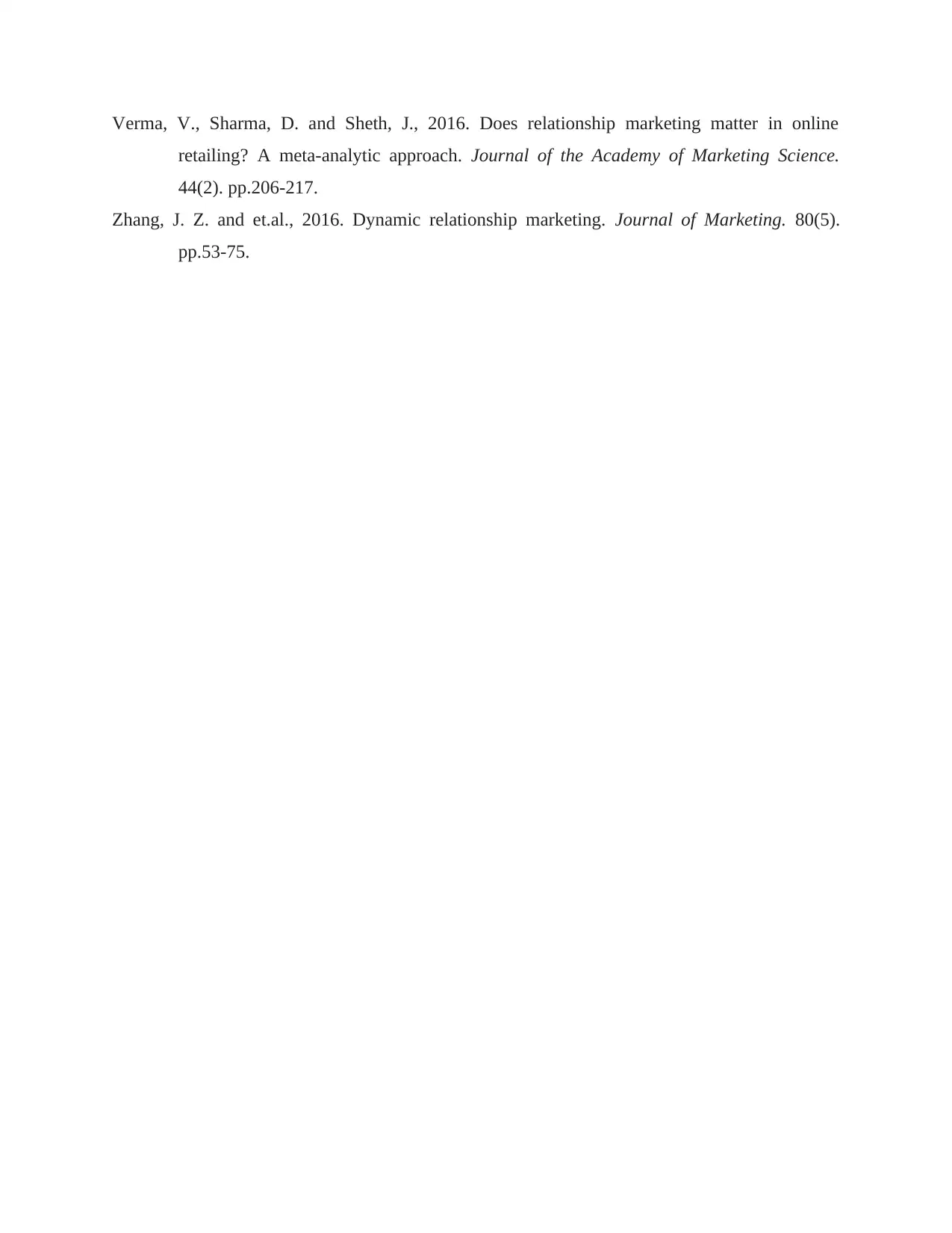
Verma, V., Sharma, D. and Sheth, J., 2016. Does relationship marketing matter in online
retailing? A meta-analytic approach. Journal of the Academy of Marketing Science.
44(2). pp.206-217.
Zhang, J. Z. and et.al., 2016. Dynamic relationship marketing. Journal of Marketing. 80(5).
pp.53-75.
retailing? A meta-analytic approach. Journal of the Academy of Marketing Science.
44(2). pp.206-217.
Zhang, J. Z. and et.al., 2016. Dynamic relationship marketing. Journal of Marketing. 80(5).
pp.53-75.
⊘ This is a preview!⊘
Do you want full access?
Subscribe today to unlock all pages.

Trusted by 1+ million students worldwide
1 out of 12
Related Documents
Your All-in-One AI-Powered Toolkit for Academic Success.
+13062052269
info@desklib.com
Available 24*7 on WhatsApp / Email
![[object Object]](/_next/static/media/star-bottom.7253800d.svg)
Unlock your academic potential
Copyright © 2020–2026 A2Z Services. All Rights Reserved. Developed and managed by ZUCOL.





